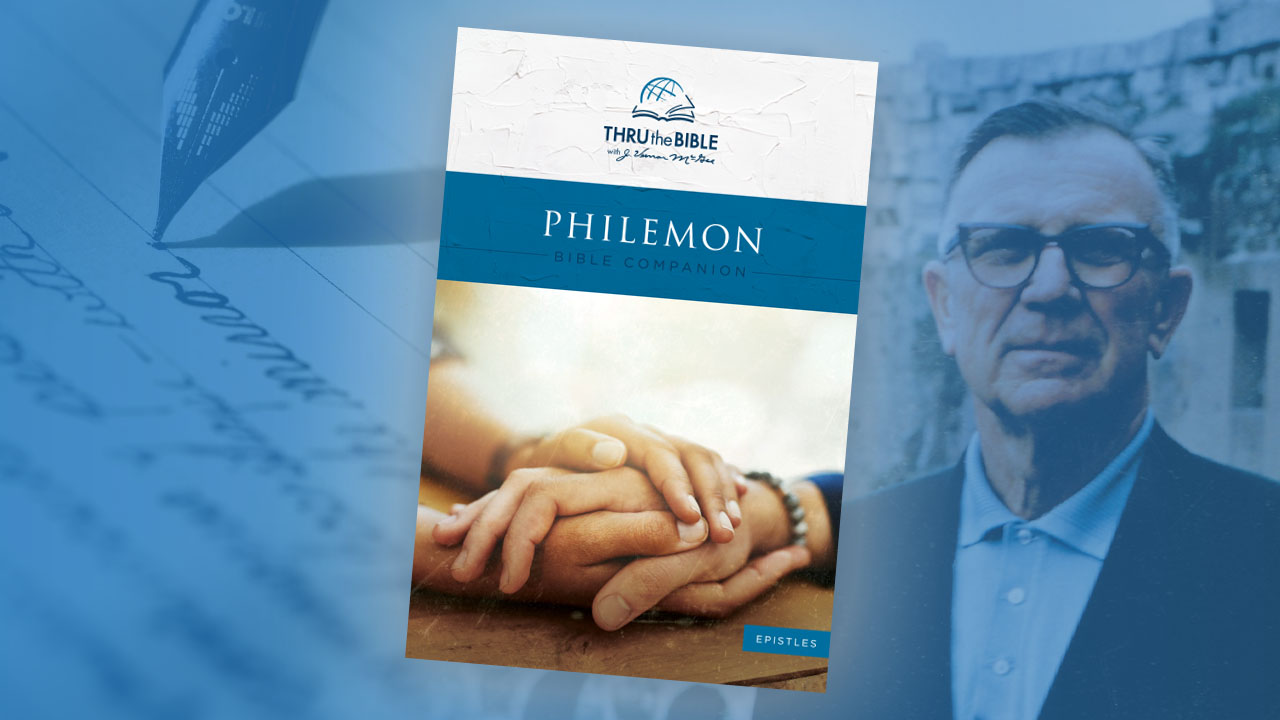Thru the Bible—Titus & PhilemonSample

Philemon

Before you start todays devotional, ask the Lord to use it to grow you up in grace and in the knowledge of our Lord and Savior Jesus Christ.

Most of the letters in the New Testament were written to churches, but we have one personal letter written from Paul to Philemon. Behind this letter is a pretty dramatic story set against the backdrop of slavery.
Philemon, a wealthy man living in Colosse, apparently knew Paul from Ephesus. Of the thousands of people who heard Paul teach, Philemon was just one who came to saving faith in the Lord Jesus.
Somewhere in Philemon’s story, his slave Onesimus made a run for it. He made it to Rome, where he got lost in the great population. Imagine him going down a Roman road one day and seeing a group of people gathered around a teacher. The odd thing was that the teacher was in chains. Onesimus had run away from chains and thought he was free, but when he listened to the teacher, he realized he was still in chains.
Onesimus asked Paul more about the gospel, and soon, a miracle happened in Onesimus’ life, and he was set free indeed. He put his trust in Christ and became a new creation. Then this new man confessed the things wrong in his life that he wanted to make right—including his status as a runaway slave. He and Paul exchanged “small world” stories and realized that Paul knew Onesimus’ master, Philemon. “Should I go back to him?”
“Yes, Onesimus, you must go back, but you’re returning to a different situation. I will send a letter with you.”
And that’s the letter we have in Scripture—the Epistle of Paul to Philemon. We see two purposes in its short pages as we read over Philemon's shoulder. The first is a spiritual illustration of Jesus’ love for us when he pleads our case before God. And the practical purpose is to teach brotherly love.
Paul calls Philemon “our beloved friend.” Paul loved this man, and he was confident in asking this favor of him. Likely Philemon was a prominent person in his city, but, more importantly, his life was a testimony to the Lord Jesus Christ. He loved the Lord, refreshed God’s people, and was faithful to them both.
About the Favor
“Receive Onesimus as a brother” (i.e., don’t punish him as a captured runaway slave). Show him brotherly love. In his other prison letters, Paul spoke of the new relationship between master and servant, and here he demonstrates how it should work. These men, belonging to different classes in the Roman Empire, hating each other and hurting each other, are now brothers in Christ, and they are to act like it.
Paul pleads for Onesimus as a “spiritual” son. He admits Onesimus would be helpful to him in Rome (prisoners needed outsiders to provide life’s basic necessities). “If you want to send him back to me, that will be all right.” We don’t know if Philemon sent Onesimus back, but it’s not a stretch to imagine him on the next boat to Rome with provisions for Paul.
Behind this beautiful letter is a grand illustration of what Jesus does for us. He pleads for us to the Father. “Receive this sinner as You receive me, Father.” We have as much right to heaven as Christ has, for we have His right to be there. “If he/she has wronged You or owes You anything, put it on My account.” Christ, on the cross, paid off your debt created by your sin by giving His life. “Treat him/her as You would Me.” That’s what it means to be in Christ—accepted in the Beloved. “Put him/her in the nicest guest room that you always give to me.”
We don’t know how this situation worked out for Onesimus and Philemon. Likely Philemon did even more than Paul requested as a true believer would. Jesus asks us to go the second mile. He is a generous Lord, and we should be generous people—even when wronged. Because it’s then the light shines brightest in this dark world.

1. What does it tell us about the Apostle Paul that he was still preaching the gospel, even when he was chained and on house arrest?
2. Why would Paul tell Onesimus to go back to slavery, even though he had escaped?
3. Onesimus’ status changed from slave to brother. What are some ways that accepting Christ has changed your identity?
Additional Resources
Listen to Dr. J. Vernon McGee’s complete teachings on Philemon.
For a deeper Study of Philemon, download the Philemon Bible Companion for free!

Scripture
About this Plan

What you believe about God affects everything you do. Titus focuses on sound doctrine and how to live it out in our lives and communities. Then discover the truth behind the story of the slave, Philemon. In this study covering two short but powerful books, Dr. McGee connects what we believe about God with how we live and helps us see that God’s love empowers us to forgive.
More
We would like to thank Thru the Bible for providing this plan. For more information, please visit: http://ttb.org
Related Plans

Engaging in God’s Heart for the Nations: 30-Day Devotional

Paul vs. The Galatians

Turn Back With Joy: 3 Days of Repentance

Expansive: A 5-Day Plan to Break Free From Scarcity and Embrace God’s Abundance

Moses: A Journey of Faith and Freedom

Serving | Spiritual Practices

Daniel in the Lions’ Den – 3-Day Devotional for Families

Nearness

Fully His: Five Marks of a True Follower
